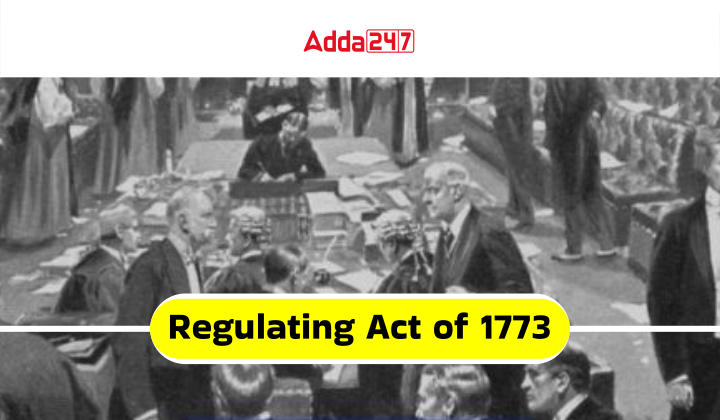Table of Contents
The East India Act of 1773, also known as the Regulating Act of 1773, was passed by the Parliament of Great Britain to overhaul the governance and management of the English East India Company in India. Its primary purpose was to introduce reforms to improve governance.
Despite its intentions to address misgovernance, the Regulating Act of 1773 failed to provide a lasting solution to the issues in India. Consequently, the Pitt’s India Act of 1784 was implemented to enact more substantial reforms. This article delves into the background, provisions, shortcomings, and significance of the Regulating Act 1773.
Regulating Act Of 1773
The Regulating Act of 1773, formally known as the East India Company Act 1772, was a pivotal moment in British India. Passed by the British Parliament, it aimed to address the East India Company’s troubled rule in India, particularly Bengal.
Background of Regulating Act Of 1773
- The misgovernance of the British East India Company led to bankruptcy in the country.
- In 1773, the British East India Company faced a financial crisis.
- The Company suffered significant losses, particularly in tea sales to America, resulting in the loss of the majority of its stakes.
- With a monopoly in trade over India and the East, the British East India Company was a vital asset for the British Empire.
- Financial constraints, exacerbated by the Company’s efforts to maintain its trade monopoly, prompted the British government to intervene.
- The Regulating Act of 1773 was passed to overhaul the management of the East India Company in India.
- Under this Act, the government established a system to regulate the Company’s activities in India.
- The Act’s overview was “An Act for establishing certain regulations for the better management of the affairs of the East India Company, as well as in India as in Europe.”
- The Regulating Act of 1773 marked the initial move towards the British government’s absolute control of India.
Regulating Act Of 1773- Provision
- The Regulating Act permitted the British East India Company to maintain its territorial possessions in India while introducing regulations to govern its activities.
- It established the position of Governor-General along with four Councillors in the Presidency of Fort William (Calcutta), collectively known as the Governor-General in Council.
- Warren Hastings was appointed as the Governor-General of the Presidency of Fort William by this act.
- The Act centralized control over the Governors in Council at Madras and Bombay under Bengal, particularly regarding foreign policy decisions. They were now required to obtain Bengal’s approval before engaging in warfare against Indian states.
- Company directors were elected for a five-year term, with one-fourth of them retiring annually, and they were not eligible for re-election.
- The Act mandated that company directors must disclose all correspondence with Indian authorities regarding revenue, civil, and military matters to British authorities.
- A Supreme Court of Judicature was established in Calcutta, with Sir Elijah Impey serving as the first Chief Justice. Judges were to be appointed from England, and the court had jurisdiction over British subjects, but not Indian natives, in civil and criminal matters.
Regulating Act Of 1773- Amendments
The shortcomings of the Regulating Act 1773 were addressed through the enactment of an amendment known as the Amending Act of 1781 or the Declaratory Act of 1781. The provisions of the Declaratory Act included:
- Removal of appellate jurisdiction from the Supreme Court.
- Exemption of revenue collectors and judicial officers at the Company’s court from the jurisdiction of the Supreme Court.
- Limitation of the geographical jurisdiction of the Supreme Court to Bengal.
- Establishment of the Governor-General and his council as the final court of appeal for civil cases appealed from provincial courts.
- An amendment allowing the Council of Ministers of the Governor-General to pass bills, laws, and issue ordinances, with the requirement that these actions must be registered with the Supreme Court.
Significance of Regulating Act Of 1773
- The Regulating Act of 1773 established the groundwork for centralized administration in India.
- It granted the British Cabinet powers to oversee Indian affairs, marking the first instance of such authority.
- Additionally, it was the inaugural occasion when the British government assumed control over the operations and management of the East India Company.
Regulating Act Of 1773- Defects
- The powers of the Governor-General of Bengal were notably restricted, with decisions reliant on the majority of the executive council, highlighting a significant flaw in the Charter Act of 1773.
- There was a lack of clear delineation regarding the autonomy of the Governors of Bombay and Madras, leading to uncertainty about when they should act independently versus being subject to the authority of the Governor-General of Bengal.
- Conflicting ideas between the Council of Ministers and the Supreme Court arose due to the absence of provisions demarcating their respective powers.
- Under the Regulating Act of 1773, the Company’s servants were subject to the authority of both the Council of Ministers and the Supreme Court, further complicating the governance structure.



 TSPSC Group 1 Question Paper 2024, Downl...
TSPSC Group 1 Question Paper 2024, Downl...
 TSPSC Group 1 Answer key 2024 Out, Downl...
TSPSC Group 1 Answer key 2024 Out, Downl...
 UPSC Prelims 2024 Question Paper, Downlo...
UPSC Prelims 2024 Question Paper, Downlo...
